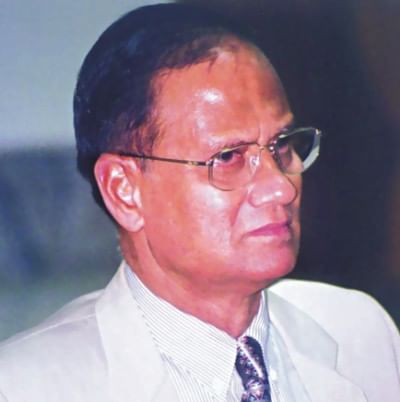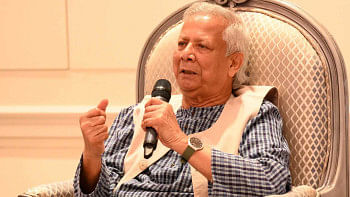Maj-Gen M. Hussain Chowdhury

Major-General Moinul Hussain Chowdhury
I am deeply saddened to learn that former adviser to the caretaker government Major-General Moinul Hussain Chowdhury (retd) passed away in the city's Square Hospital on October10.
I did not expect his untimely death because I used to contact him quite often. Sometime in July, when I spoke to him as he returned from Singapore, he told me he was not keeping well. I did not ask him further about the nature of his illness. Since I was away from Dhaka for some time, I could not keep in touch with him.
I came to know him first when I replaced him in 1984 in the Philippines. Later, I met him in Canberra when he was posted there in the late '90s. Although coming from different life experiences, I gradually became close to him as the years passed by.
He was a tall and fit person and was typically an army officer in his manners. He was not only a distinguished army officer but also an excellent human being.
Any job he took on was carried out with great courage and determination. He was a hard master and did not tolerate inefficiency. What made him different was his unruffled conviction that there was a solution to every problem. He had his own style and wherever he served he made an impact on others.
He was a straight-talker of truth and did not mince words, although he knew that he might be unpopular in saying so he did not care much. He looked at things from a dispassionate perspective.
He was a great nationalist, and in his conversation he used to make clear that he detected a large gap between the rhetoric and reality of freedom and democracy in the country. He thought the best way to judge the health of a nation's heart was by how it treated the disadvantaged and the poor of the society.
He was critical of Western interference in the affairs of developing countries and believed adherence to ideals advocated by the West might not be necessarily suited to developing nations
He was a great narrator of events of his life during the war and after the war in a manner that was interesting and captivating to all of us. His study was replete with certificates of honour, medals and other military decorations, which he earned during his extraordinary career. He displayed good sense of wit and humour when we used to admire him for his courage during the war.
He was a very hospitable person and used to look after each guest with warmth whenever he invited people to his residence on social occasions.
General Moinul joined the Pakistan army in 1962 and was commissioned in 1964. He also took part in the Indo-Pak war in 1965.
A valiant freedom fighter, he revolted as a captain against the Pakistan army from Joydevpur cantonment in March 1971. During the Liberation War, he led the 1st and 2nd East Bengal Regiment. He led his regiment into Dhaka on December 16, 1971. The Bangladesh government conferred the Bir Bikram gallantry award on him for his bravery during the Liberation War.
He was ADC to Bangabandhu Sheikh Mujibur Rahman and had been the youngest Major-General in the army at the time. He had a posting in London before he was promoted to the rank of Major-General.
He was appointed, on deputation, Bangladesh ambassador to the Philippines in 1982. He subsequently served as ambassador to Indonesia, Singapore, Thailand and Australia. Although he served overseas he missed his army career, which was his first call of duty.
In 2001, General Moinul Hussain was an adviser to the caretaker government headed by Justice Latifur Rahman. He reportedly played a key role in the caretaker administration, besides his portfolios.
After his retirement he became a consultant to UNDP for some time in Dhaka. He used to appear in various talk-shows in TV and provided frank answers to the issues on which he was being interviewed. Many people might not agree with his views, but he demonstrated his courage and conviction in laying bare the facts and hidden causes of the problems , exhibiting his penetrating mind.
He wrote his autobiography in which many interesting facts are provided, which are unknown to people, about the Liberation War. He used to write articles in newspapers, both in Bangla and English, which were different in kind and laced with humour.
He is survived by his wife, a son, a daughter and a host of relatives and friends to mourn his death.
May his family get the fortitude and strength to bear this irreparable loss. We pray to Allah for eternal peace of his soul.

 For all latest news, follow The Daily Star's Google News channel.
For all latest news, follow The Daily Star's Google News channel. 



Comments